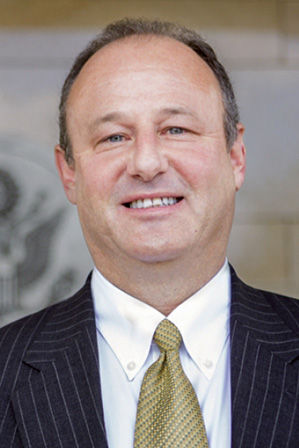Accomplishments and Challenges
President’s Views
BY ERIC RUBIN

This is my penultimate President’s Views column for the FSJ. I will finish my second term and four years in office on July 15. In my final column next month, I will share my views on what needs to happen to make the U.S. Foreign Service healthy, happy, and relevant after a very trying two decades.
I took office in July 2019 during the Trump administration in the wake of a series of damaging decisions and unprecedented challenges for our members and our Service.
The State Department hiring freeze imposed by the Trump administration in its first two years continues to distort our demographics and has led to a serious deficit of mid-level officers in key positions. The first impeachment proceedings against President Trump put the Foreign Service and many of our members in the crosshairs of American politics and challenged us to find a way to defend the career Service.
The impact of those difficult years was serious. The number of people signing up to take the Foreign Service Officer Test declined dramatically in the last 10 years, reaching a low point during the previous administration. There are many reasons for this decline, and not all relate to politics. But the sense that career public service was not valued or respected definitely played a role.
AFSA’s biggest challenge in the 2019-2021 Governing Board term was to defend the Foreign Service. When our members were subpoenaed to testify or give depositions in the impeachment proceedings, they were told that the U.S. government would not help with their legal costs and that they could neither accept pro bono legal representation nor privately raise funds to support their legal defense. Both were considered violations of ethics rules.
AFSA went to battle stations. We won U.S. government reimbursement for our members’ legal bills, up to the statutory Justice Department limits. We won the right for AFSA to raise funds to support their legal costs, and we won the right for our members to accept pro bono representation via AFSA. That career employees should testify before Congress on live national television without expert legal counsel is absurd, but that was the Trump administration’s initial position.
Our colleagues who testified made us proud, eschewing politics and telling the truth as their oath to the Constitution required.
We raised more than $750,000 in three months for our legal defense fund and ensured that every penny of our members’ legal bills was covered. We are very proud of that record.
Meanwhile, we have spent the past four years pushing for equity for members of the Foreign Service in relation to other federal services. During the COVID-19 pandemic, we pushed for and won 20 hours of administrative leave for members who needed it to deal with child and elder care and other challenges.
We lobbied Congress to extend to members of the Foreign Service the protections that other federal employees enjoy. We secured their right to cancel apartment leases, cell phone contracts, and car leases without financial penalties when they receive official travel orders.
We won in-state college tuition for members of the Foreign Service and their dependents in their state of domicile. Most recently, we won the right for Foreign Service kids to apply for Virginia’s Governor’s Schools from overseas.
We also were part of a powerful coalition that won a significant increase in funding for all the foreign affairs agencies in last year’s budget process. The prospects for the coming year are difficult, but we hope we will be able to build off last year’s gains.
AFSA plays multiple roles. We fight for our members as individuals, and we fight for the Foreign Service and our profession as the most important alternative to war and destruction.
We are grateful to have the highest percentage membership of any federal union, and we take our obligations seriously. Our work is by no means done, but I believe we have made a real difference in many important areas.
As always, please let us know how we can do better in representing you: member@afsa.org.
When sharing or linking to FSJ articles online, which we welcome and encourage, please be sure to cite the magazine (The Foreign Service Journal) and the month and year of publication. Please check the permissions page for further details.

